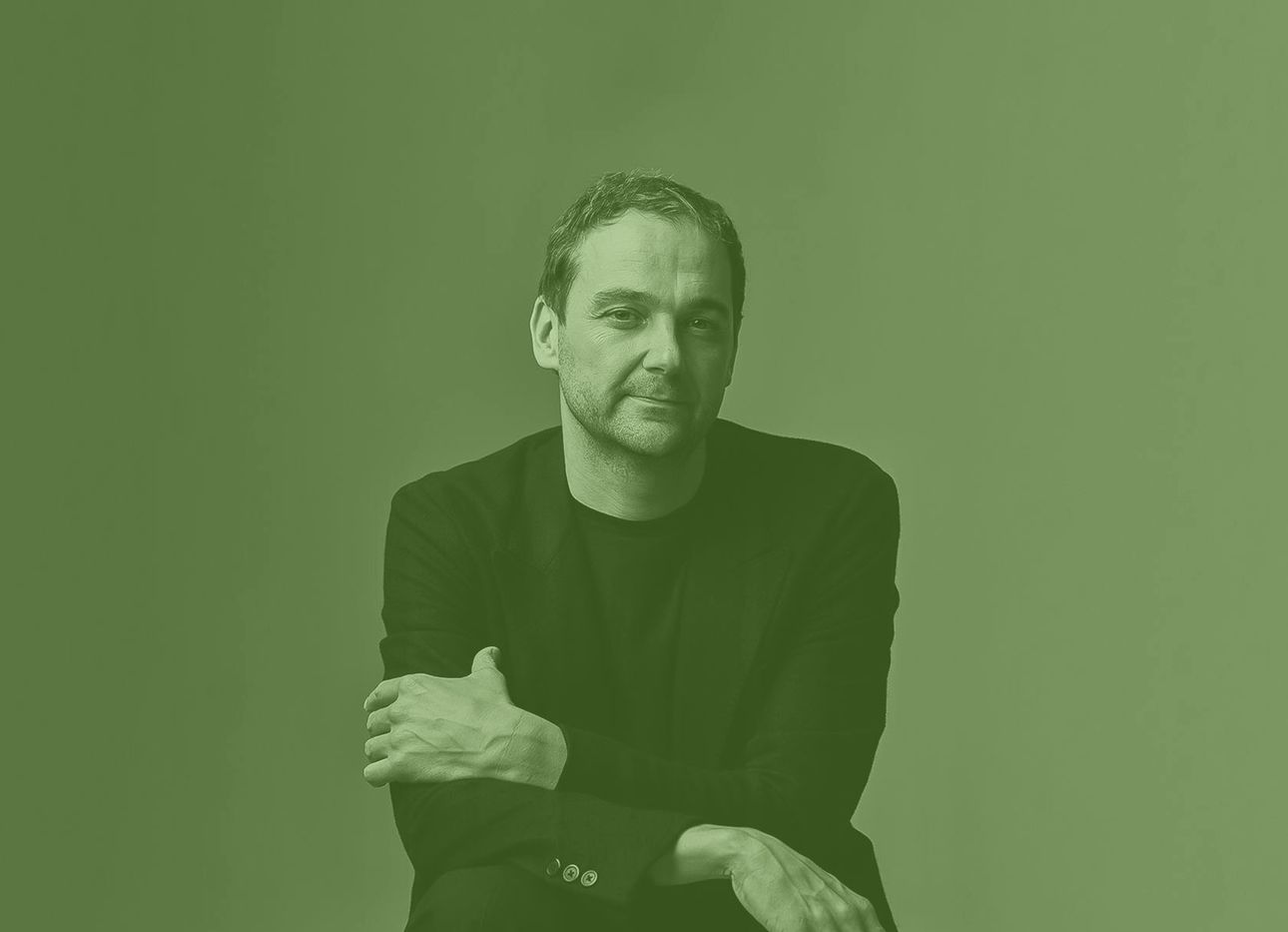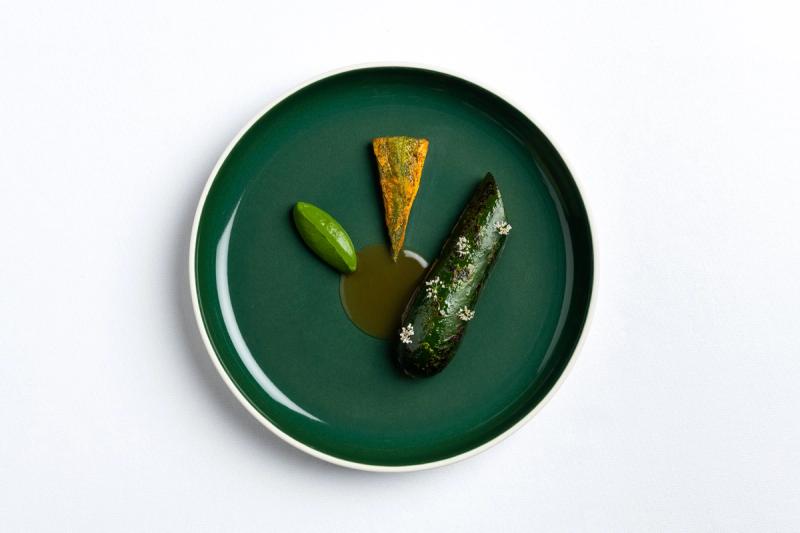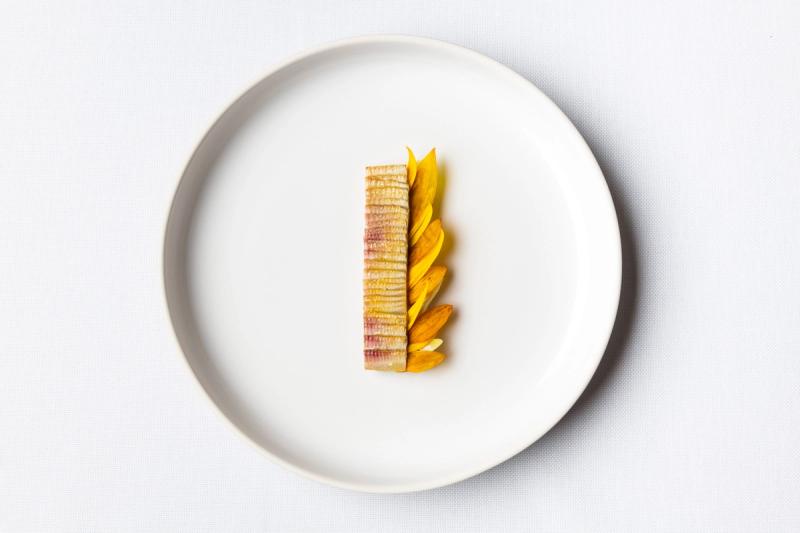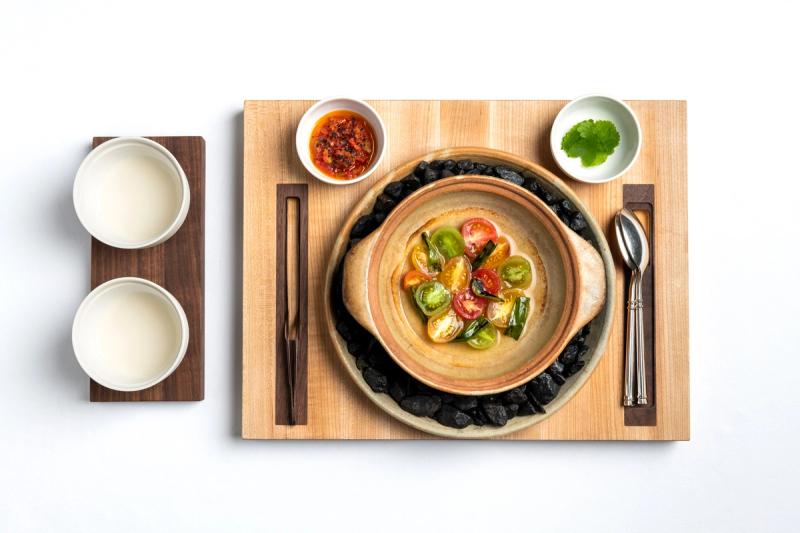
Daniel Humm’s Giant, Thought-Provoking, Plant-Based Pivot
In the summer of 2021, just over a year into the Covid-19 pandemic, chef Daniel Humm took a giant, thought-provoking (and, as he would in time convincingly argue, absolutely vital) leap at his three-starred Michelin restaurant, Eleven Madison Park. Long known for its meat and fish staples—sliced sturgeon; a tabletop clambake; beef tartare with caviar and smoked bone marrow; and its former signature dish, duck with daikon and plum—the restaurant pivoted to an entirely vegan menu, both as a response to an increasingly dire climate reality and also as a way of redefining fine dining for our precarious present. (That fall, Humm spoke about this radical transformation on our Time Sensitive podcast.) Within months, food and restaurant critics came with their meat knives out, most notably The New York Times’s Pete Wells, who, in a particularly cranky review, wrote of a beet dish that it “tastes like Lemon Pledge and smells like a burning joint.” While there were certainly menu kinks to work out early on, Eleven Madison Park’s shift was undoubtedly an impressive feat. Within a year or so, Humm and his team proved their plant-based prowess in the kitchen. Last fall, Eleven Madison Park was named the first vegan three-starred Michelin restaurant in the world—a catalytic moment for Humm, for fine dining, and for what he hopes will be our plant-based future. Over the past two years, the menu has evolved into a rich, fully formed, rigorously executed cuisine that shows that plants can be just as, if not more, versatile, interesting, and delicious as meat and fish.
Here, Humm talks about the recent Michelin honor, his collaborative farming operation upstate, and his admiration for three contemporaries in food and fashion: the chefs Alice Waters and Dan Barber and the fashion designer Gabriela Hearst.
Let’s start with Eleven Madison Park becoming the first vegan restaurant to be awarded three Michelin stars. How does it feel to receive this honor?
I’m extremely happy. The news was so important for us, more than I even thought. Breaking away from the norm, I was aware that we might not get the buy-in of traditional institutions like people who review and rank restaurants, and I was okay with that. I was well aware that we might not be awarded in the same way as we were before.
Growing up in Europe, and always having Michelin as part of my cooking life, was always so meaningful. Funnily enough, we actually had three stars for exactly eleven years, and eleven has been an important number in my life—obviously, with Eleven Madison Park, but it was actually 11/11/11 when we first received the three stars. So now, eleven years later, to receive the three stars as a fully vegan restaurant was really meaningful. But when you go against the norm—against the system—you’re gonna lose some people’s support. But then there’s also some support that you need. You need the validation. This move was a controversial one. It’s been a mixed bag of people buying in and people not buying in.
Michelin wrote the rules on what a fine-dining restaurant is. It’s been over a hundred years that they’ve been reviewing restaurants. For them to make this step, it’s really powerful. I believe it will change fine dining forever.
Can you share some of the details about what it was like to make this change? Because it wasn’t easy, as you said. There were lots of challenges: the naysayers, the pushback from old clientele, the catty reviews. I mean, it’s hard being at the top.
Yeah, it was challenging. I felt so strongly in my heart that the future of food is plant-based. You don’t need to dig that deep to realize that. I happen to have this platform of Eleven Madison Park, and we also have the creativity. Our thing is creativity with food. So I think creativity should be applied towards a plant-based future.
When I reopened the restaurant, [in the summer of 2021], I didn’t think I should think about creating yet another version of a butter-poached lobster, or of a caviar preparation, or of our lavender-roasted duck. It was clear to me that we should use our creativity towards this, and it came purely from a very creative place. It seemed exciting to create something entirely new. At the beginning, it felt like, Oh, we would leave all this knowledge behind. We spent years perfecting these things, and now, these recipes are worthless to us. But in fact, we realized from where we are today that [the change] has been only expansive and liberating.
We were held back before, because there’s a certain expectation when you go to a fine-dining restaurant. You kind of already know what the meal is going to be like. So when I look back, I almost think our cooking was just creating these condiments—like the condiments for the lobster, the condiments for the duck, the condiments for the caviar. Today, we’re entirely free. You have no idea when you come to Eleven Madison Park what’s going to be your main course, what’s going to be your starter. And isn’t that what’s magical? When you get to have an experience that you can’t have anywhere else and you don’t know exactly what you’re going to get.
There’s also the aspect of: This isn’t about me; this is about the restaurant. This is about an entire team. To motivate the team, and for the team to be driven, is everything. We know that by receiving three Michelin stars, for a vegan cuisine, it’s a historic moment in food.

Tell me a little bit about your personal relationship with plants and plant-based eating. Take me back to your childhood, to your time as a young chef, how you’ve seen the role of plants in your cooking evolve over time. This didn’t just happen overnight. This was a long, circuitous evolution.
I grew up in Switzerland, in a small town in the middle of nowhere, where my mom would bring the ingredients directly from the farm. Vegetables were always the star of the show. There was one meal a week where there was a whole chicken or roast or a leg of lamb, but most of our diet was around plants.
I also used to ride bicycles competitively. Food as something for your body—as fuel for your body and something that’s healthy for you—was always top of my mind. Eating plants always felt better than anything else. It always felt like real fuel, because you’re eating something that’s alive. It energizes you. There’s an energy you get from it.
In my cooking, I always felt there was one cookbook. It was the Michel Bras cookbook [Essential Cuisine] that came out in ’98. [Editor’s note: The book was released in 2002, not 1998.] That changed part of my life as a chef, for sure. On the cover of that book was a salad of, like, thirty different vegetables. This was in the height of French gastronomy. When I saw the cover of that book, I was just so excited. I was blown away. I became a student of Michel Bras’s cuisine. He had a fine-dining restaurant [Maison Bras]. You would get one course. You would get this really special onion that’s been roasted in this wood fire. An onion dish at a fancy restaurant was mind-blowing to me.
I was always drawn toward this. I knew that creativity was always shown most when working with vegetables, because there are just so many opportunities [in terms of] how to go about it. When you have a piece of fish or a piece of meat, you’re pretty limited in what you can do with it. You can execute it really well, but in terms of creativity, you’re kind of limited. I was always drawn to my contemporaries’ or my mentors’ work with vegetables.

Give me a few examples of some of these vegetables or plants that you’ve gotten to play with so far. I mean, there’s been some extraordinary things I’ve had the pleasure of tasting, like the sunflower dish.
What’s been amazing is we started our own farm. That’s something I got so lucky with, because a very close friend of mine [Maciek Kobielski]—he’s a fashion photographer—he moved upstate, and he had all this land, and he started growing vegetables during the pandemic, just for his family. That’s when I became pretty certain that I [would] open the restaurant as fully plant-based. He got so excited about growing vegetables that we decided together that we would create this farm to grow all of the vegetables for our restaurant. He has just been so incredible and reliable and driven. This has become a huge benefit to the restaurant.
We’re now in the fall, thinking about next summer, what to grow and what to plant. [Editor’s note: This interview was recorded in the fall of 2022]. To have that ability to plan this far out, in some ways, it’s a responsibility and it’s a little scary. But then when you get used to it a little bit, it becomes a superpower. So, for example, this last summer, we were growing the sunflowers, and when you harvest the sunflowers, right before they open up to blossom, they’re kind of like little artichokes, and you can kind of cook them similarly to artichokes, but you’re eating sunflowers.
We’re growing this Chinese lettuce called celtuce. The juice is so delicious and smells like jasmine rice. The ability to introduce people to things that they haven’t had before is cool. We’re also, of course, now able to compost. There’s this virtuous cycle of things coming to our restaurant, the leftovers’ waste going back to the farm. Which is also really important to us: to create this kind of cycle.
You’ve previously mentioned to me the influence Alice Waters of Chez Panisse has had on you. I was wondering if there have been other beacons for you as you’ve headed in your new direction, whether in food, fashion, or other fields—thinkers who have sort of shown you the way, so to speak?
It’s really the people who use their language for something greater than just their art. When I look back at the culinary landscape and people who will be remembered, Alice Waters is very much on top of that list. She has, of course, this wonderful restaurant, Chez Panisse. But then all of the work she has done around school lunches and education about food—Edible Schoolyard—it’s tremendous. I also respect Dan Barber [the guest on Ep. 62 of our Time Sensitive podcast] a lot. He has Blue Hill at Stone Barns, which is also really pushing the envelope on farming and the seeds that we’re using—the heirloom kinds, rather than monocrops. I think there’s so much work to be done there, and he’s really leading that.
There are other people in other fields. My close friend Gabriela Hearst [the guest on Ep. 32 of Time Sensitive]—what she’s doing in fashion is incredible, really rethinking what that can be. In some ways, there’s a similarity between a fashion designer and a chef, because a fashion designer has all of these collections that come out on a regular schedule—it’s sort of like our seasons—and there’s a deadline. There’s a collection, and usually, there’s a little bit of a theme to it. In terms of luxury, as well, [fashion designers and chefs both ask], What is luxury? I think luxury comes with a responsibility, this privilege. We do have to shine a light to make a difference. I think it’s crucial.

I was hoping you might speak here a little bit to how you view the top-down impact of what you’re doing. That’s the responsibility of luxury you were just alluding to. Do you think there could be, or will be, a trickle-down effect to the notoriety of your plant-based pivot? And do you think that this new direction could also impact how people think about food systems?
Yeah. During the pandemic, I definitely thought about the impact that Tesla has made versus the impact that Toyota Prius made. Toyota Prius was the first hybrid car, like thirty years ago, which is groundbreaking on its own and really inspiring. But it didn’t really make the difference like Tesla did. I think Tesla made that impact because it was about making a great car. It’s about a contemporary car that, of course, is electric. For me, Eleven Madison Park is sort of like a contemporary restaurant. I think I would say that people who are driving a Toyota Prius, they drove it because it was a hybrid car. I think the person who’s driving Tesla is driving it because they love that car. My hope is that people come to Eleven Madison Park because they just love that restaurant. Therefore, if we can make it magical and beautiful and luxurious, without that big message of being plant-based…. The message should be: “It’s just really delicious.”
On a personal level, have you noticed changes to your own health and diet as a result of the switch? Have you, by cooking plant-based, changed your own diet?
Definitely. As I said before, it came from a creative place at first. My diet has always been plant-forward. I’ve never been a “meat person.” But I have had meat as part of my diet. Today, when I go to someone’s house, and that’s what they cook, I will still enjoy having this meal. But on my own, I have adopted a vegan diet, because it just feels better. You have more energy; you sleep better.
To close, what to you, Daniel, is the good life?
The good life, to me, is always choosing joy over fear. I had this conversation with a friend the other day. Every day or two, everything that comes up in your life, there’s really only two decisions you can make: You can choose approaching it with joy, or you can choose approaching it with fear. These are the two choices you have. They really can’t live together. I think approaching everything with joy is the good life to me. There’s no other choice. Just joy.
This interview was recorded in The Slowdown’s New York City studio on October 31, 2022. The transcript has been slightly condensed and edited for clarity.